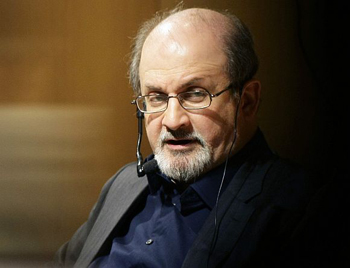 Kolkata, Feb 1: Trinamool Congress leader Sultan Ahmed defended West Bengal Chief Minister Mamata Banerjee saying she did nothing wrong in blocking author Salman Rushdie's visit to Kolkata. "There is nothing shameful, I am congratulating the state government for taking the right decision," Ahmed said.
Kolkata, Feb 1: Trinamool Congress leader Sultan Ahmed defended West Bengal Chief Minister Mamata Banerjee saying she did nothing wrong in blocking author Salman Rushdie's visit to Kolkata. "There is nothing shameful, I am congratulating the state government for taking the right decision," Ahmed said.
Hitting out at Rushdie, Ahmed said, "You cannot denigrate Islam and get away with it. I welcome the decision of Mamata Banerjee to not let him in. It is not free thinking, abusing a religion is not free thinking. In the land of Swami Vivekananda, Kazi Nazrul Islam, we don't support this kind of a thing in the name of free thinking."
This came after Salman Rushdie accused the Mamata government of blocking his visit to Kolkata. Reacting on Twitter, Rushdie blamed Mamata Banerjee for ordering the police to block his arrival. Rushdie's trip to Kolkata on Wednesday was cancelled as the venue for his press conference could not be confirmed. He was to promote Deepa Mehta's film Midnight's Children, which is based on his novel. Rushdie has also refuted the claim of the Kolkata Literary meet organisers that he wasn't invited for the meet.
In his tweets, Rushdie said, "The simple fact is that the Chief Minister Mamata Banerjee ordered the police to block my arrival. The Kolkata lit meet organizers are lying when they say I wasn't invited. I have emails and plane tkt sent by them to prove it. The police gave my full itinerary to the press and called Muslim leaders, clearly inciting protests."
Rushdie ridiculed TMC's Saugata Ray saying, "I did not get 'friendly advice' to stay away from Kolkata. I was told the police would put me on next plane out."
The writer himself has expressed anguish at the growing cultural terrorism. In a statement, Rushdie said, "The assaults upon the artistic and intellectual freedoms of, for example, Maqbool Fida Hussain, Rohinton Mistry, AK Ramanujan, James Laine, Deepa Mehta, Ashis Nandy, Kamal Haasan and others add up to what I have called a cultural Emergency. I can only hope that the people have the will to demand that such assaults on freedom cease once and for all."
Meanwhile, Director Deepa Mehta who was also invited to the literary meet, said she cancelled her visit out of solidarity. "I didn't go to Kolkata out of solidarity for Salman Rushdie. It is not fair that he was disinvited at the last minute. He was told by the police, or I'm not clear who were the powers who told him, I think it was the Chief Minister's decision. He was told that he shouldn't fly in or if he does, he'll have to fly right back, so he decided it didn't make sense to go," Deepa Mehta said.





Comments
Add new comment